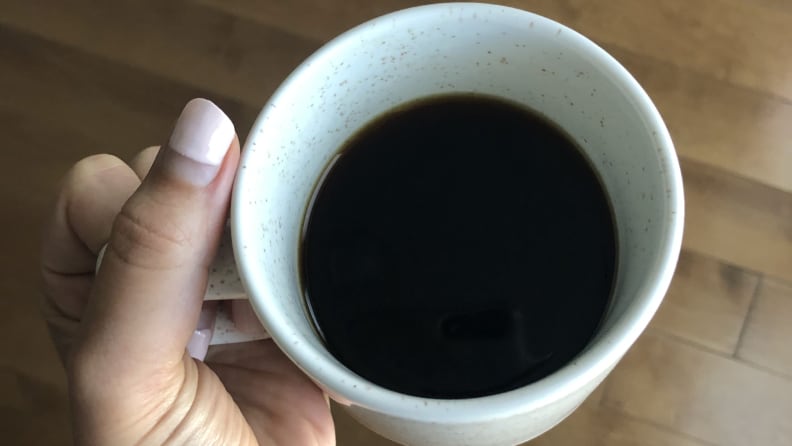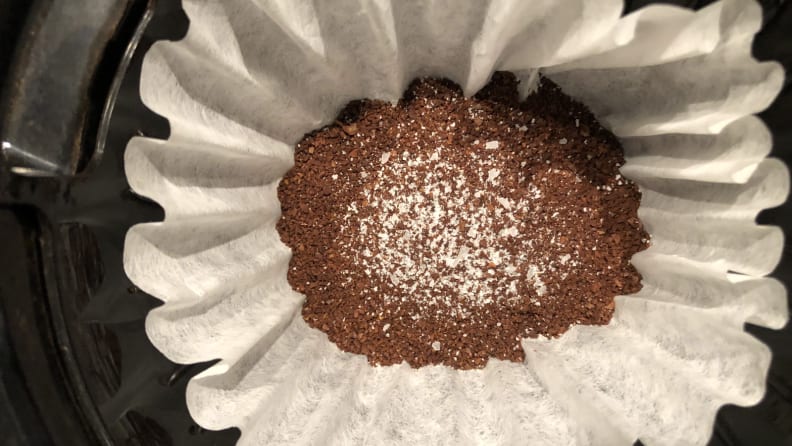I tried putting salt in my coffee instead of sugar—here's what happened
Don't knock it til you try it.
Products are chosen independently by our editors. Purchases made through our links may earn us a commission.
From bulletproof coffee to pumpkin spice lattes, people have found so many ways to ruin a perfectly good cup of black coffee. And while I'm the type of snobby black-coffee drinker that silently judges the people at the cream and sugar station at Starbucks, there is one thing I now add to my coffee: salt.
Yes, you read that right. I put salt in my coffee.
It's something I tried for the first time this week after reading that Alton Brown, master chef extraordinaire, swears by it. Intrigued, I wanted to put it to the test for myself—and now I'm hooked.
Why people are adding salt to their coffee
According to Alton (and other salt enthusiasts), mixing a little bit of salt into your coffee grounds before you start brewing reduces the bitterness of your coffee and can improve the flavor and taste. "Not only does salt cut the bitterness of coffee, but it also smooths out the 'stale' taste of tank-stored water," he wrote in a Facebook post.
It's a trick that has actually been used in European countries for years (and even the military has been known to add salt to improve their notoriously crappy coffee). And there's even been research done that shows that salt is better at neutralizing bitterness than sugar.
How salt changed the taste of my coffee

My morning cup of coffee didn't look any different with the salt.
Since I drink my coffee black, I am very sensitive to how coffee tastes (a.k.a there's no cream or syrups to mask the coffee's natural flavor). So even if a pot is just slightly more bitter, more strong, or more watery than it was the day before, I'll notice immediately.
And that's exactly what happened when I started putting salt in my coffee grounds. To be fair, the first day, I definitely only added a slight sprinkle and noticed nothing. But the second day, I decided to take Alton's original advice and poured a healthy 1/4 teaspoon of kosher salt on top of my grounds before turning on my coffeemaker. While I was pouring my coffee, it didn't look or smell any different.
However, when I took my first sip, I could tell right away that something was different—in a good way. I'm used to the bitterness of black coffee (in fact, I love it) but there's a fine line between bitter enough and too bitter. This cup tasted slightly mellower than what I was used to. It was like my standard cup of dark roast but with less of a sharp aftertaste. I was hooked. It was subtle enough that I could still get that boldness I crave yet and the flavors almost seemed heightened.
How much salt should you use?

Here's how much salt I sprinkled into my grounds.
It all depends on how much coffee you're making. I make a six-cup pot every day, so I experimented with varying amounts of salt in my grounds. I found that anything under 1/4 teaspoon wasn't even worth adding (that's literally just one measly sprinkle). However, when I added 1/2 teaspoon, my coffee had a weird taste that I can only describe as a hint of ocean water. Not exactly what you want first thing in the morning.
The verdict: For six cups, I found 1/4 teaspoon plus an extra sprinkle or two to be ideal. Any more and I could taste the salt. Any less and it's just a waste of salt.
Other ways to make a better cup of coffee
Maybe you aren't willing to start salting your coffee. That's okay—there are still plenty of tricks to brewing Starbucks-worthy coffee at home. Remember that your java will only taste as good as the ingredients you use, which means fresh-ground beans will always be optimal. For that, you'll need a good coffee grinder (like our experts' favorite electric grinder, the Baratza Encore) and high-quality beans.
Then, you can choose whether you want to use a single-serve pod coffee maker, a drip coffee maker, or a pour-over. I have all three. And while on weekday mornings I often settle for the drip coffee maker just for convenience and time, my absolute favorite cups of coffee are always made with my pour-over. The flavors are brighter and bolder and it just tastes so much smoother.


